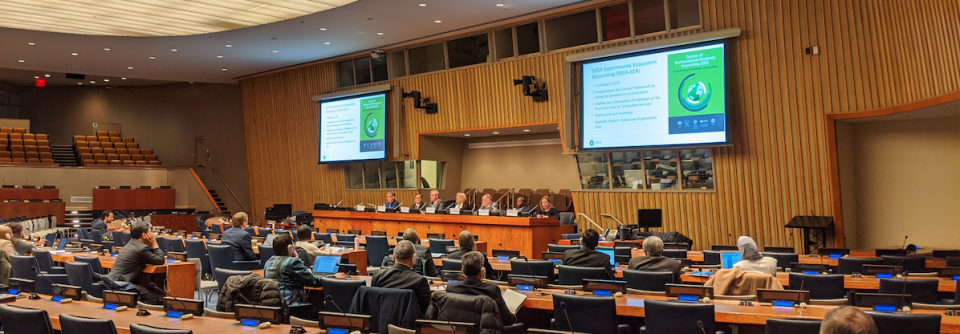Taking the Environment into Account at the UN Statistical Commission

The 51st session of the United Nations Statistical Commission (UNSC) took place earlier this month from 3-6 March 2020, giving the United Nations Committee of Experts on Environmental-Economic Accounting (UNCEEA) an opportunity to present the progress made over the past year. Some of the key points highlighted by the UNSC included the importance of the SEEA Experimental Ecosystem Accounting (SEEA EEA) in supplying a common measurement framework for the post-2020 global biodiversity framework and the work done on mainstreaming the SEEA as the statistical framework to support various initiatives. In particular, the UNSC commended countries for using the SEEA for country-level reporting on the SDGs and welcomed the integration of the SEEA into SDG indicators 15.9.1 and 12.b.1.
Another highlight was the commendation of the UNSC on the substantial progress made on the revision. The importance of an agreed revised SEEA-EEA was not lost on the UNSC, as the Commission “emphasized the urgency of providing a standardized methodology for ecosystem accounting that reflects the revision and reinforces the role of national statistical offices as data stewards; and supported the aspiration to elevate the revised SEEA Experimental Ecosystem Accounting to SEEA Ecosystem Accounting”.
Ecosystem accounting was also the focus of the UNCEEA’s High-Level Panel: Taking the Environment into Account. The panel took stock of the progress made on the revised SEEA-EEA, discussed how the accounts could be used to mainstream natural capital into the policy debate and discussed how the SEEA has helped shift the role of NSOs from data compilers to data custodians. The demand for the SEEA in the context of global and national policy demands was discussed by representatives of several countries and international organizations, including the UN Statistics Division, Eurostat, New Zealand, South Africa and the IMF. In addition, several countries shared their experience and results in developing the SEEA EEA in their countries, including India and Mexico (as part of the E.U.-funded NCAVES project), Uganda, and Canada. Finally, a presentation on ARIES (Artificial Intelligence for Ecosystem Services) demonstrated the expanding potential of big data to support the compilation of the SEEA EEA.
For more information:
- To access the full conclusions of the 51st session of the UNSC, please see here: https://unstats.un.org/unsd/statcom/51st-session/documents/Report-2020-Draft-EE.pdf
- The recording of the agenda item can be found here, starting at approximately 1 hr and 32 minutes into the recording. http://webtv.un.org/search/4th-meeting-51st-statistical-commission-3-6-march-2020/6138503705001/?term=&lan=english&page=2
- For more information on the high-level panel, please visit the meeting page here: https://seea.un.org/events/high-level-panel-taking-environment-account
- A recording of the panel can be accessed here: High Level Panel: Taking the Environment into Account (2 March 2020).
